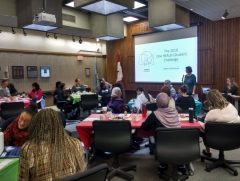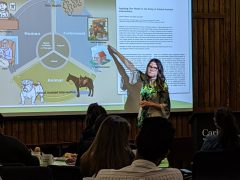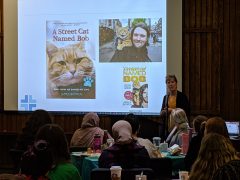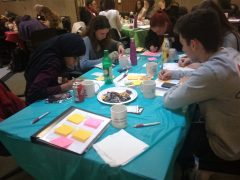This past Friday marked the official launch of the 2019 One HEALtH Student Challenge! The kickoff event featured 2 fascinating guest speakers, several expert consultants, 6 graduate mentors, and 30+ excited undergraduate competitors eager to start tackling this year’s topic from a One Health perspective. The students came from a wide range of disciplines, including psychology, neuroscience, biology, health sciences, public policy, and economics.
 The day began with an introduction to the meaning of One Health by Dr. Kim Matheson, Culture & Gender Mental Health Research Chair at Carleton and Director of the CHAIM Centre. Dr. Matheson also introduced the topic of this year’s challenge, which is to develop a framework for designing a plan for the Ottawa inner city area to create the environment and social conditions that allow anyone, including marginalized or vulnerable populations, to be able to effectively care for and derive the health benefits of companion pets.
The day began with an introduction to the meaning of One Health by Dr. Kim Matheson, Culture & Gender Mental Health Research Chair at Carleton and Director of the CHAIM Centre. Dr. Matheson also introduced the topic of this year’s challenge, which is to develop a framework for designing a plan for the Ottawa inner city area to create the environment and social conditions that allow anyone, including marginalized or vulnerable populations, to be able to effectively care for and derive the health benefits of companion pets.
After a light lunch, Dr. Colleen Dell, a professor and research chair in One Health & Wellness at  the University of Saskatchewan, spoke to students about the concept of zooeyia (reciprocal benefits between humans and animals) and emphasized the importance of the human-animal bond for promoting wellness. In her research with animal-assisted interventions, Dr. Dell has found that people struggling with substance use sometimes connect to animals in unique ways, reacting to the unconditional acceptance and non-judgmental support offered by furry helpers. In Dr. Dell’s words, “The animals were able to provide something that the humans couldn’t, or wouldn’t.”
the University of Saskatchewan, spoke to students about the concept of zooeyia (reciprocal benefits between humans and animals) and emphasized the importance of the human-animal bond for promoting wellness. In her research with animal-assisted interventions, Dr. Dell has found that people struggling with substance use sometimes connect to animals in unique ways, reacting to the unconditional acceptance and non-judgmental support offered by furry helpers. In Dr. Dell’s words, “The animals were able to provide something that the humans couldn’t, or wouldn’t.”
 Next students heard from Dr. Sue Kilborn, a veterinarian and board member of Community Vet Outreach, an organization that provides pro-bono animal care alongside human health services to low-income pet owners. Dr. Kilborn spoke to students about how veterinary care for pets can act as a gateway into a vulnerable person’s life: “Because in many cases [pets] are the single most important relationship in their life, they’ll do anything to get care for them. Once that’s delivered, people are open to dialogue about their own health care.” In this way, pets may be catalysts for positive health and behaviour changes.
Next students heard from Dr. Sue Kilborn, a veterinarian and board member of Community Vet Outreach, an organization that provides pro-bono animal care alongside human health services to low-income pet owners. Dr. Kilborn spoke to students about how veterinary care for pets can act as a gateway into a vulnerable person’s life: “Because in many cases [pets] are the single most important relationship in their life, they’ll do anything to get care for them. Once that’s delivered, people are open to dialogue about their own health care.” In this way, pets may be catalysts for positive health and behaviour changes.
Towards the end of the day, team mentors facilitated a short activity with students meant to get  them thinking about the Challenge topic and prepare them for managing group dynamics over the course of the competition. With these perspectives in mind, students will spend the next 6 weeks working in interdisciplinary teams to develop their own framework to promote healthy human-pet interactions in a dense urban area. Each team will be supported by a graduate mentor and will have access to a host of project consultants with expertise in neuroscience, health psychology, urban design, public policy, and other related areas. We’re looking forward to seeing what the teams come up with!
them thinking about the Challenge topic and prepare them for managing group dynamics over the course of the competition. With these perspectives in mind, students will spend the next 6 weeks working in interdisciplinary teams to develop their own framework to promote healthy human-pet interactions in a dense urban area. Each team will be supported by a graduate mentor and will have access to a host of project consultants with expertise in neuroscience, health psychology, urban design, public policy, and other related areas. We’re looking forward to seeing what the teams come up with!
Check back here or follow us on Twitter @CHAIM_Centre for more updates as the Challenge progresses!